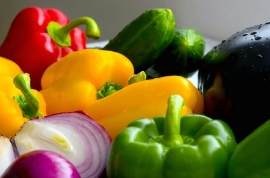Is it better to eat fruit and vegetable peels for the nutrients or cut them off to avoid contaminants?
Helen Rasmussen, a senior research dietitian at the Jean Mayer USDA Human Nutrition Research Center on Aging, gives us the scoop

“There are commercial fruit and vegetable washes, but their effectiveness is unclear,” says Helen Rasmussen, who is also an instructor at the Friedman School. Photo: iStock
“We will all eat a peck of dirt before we die,” or so the adage goes. I’ll bet our ancestors never imagined that antibiotic-resistant bacteria and modern-day pesticides would be included in the dished-up dirt.
The good news is that the peels of most fruits and vegetables do contain some plant chemicals as well as beneficial fiber. The bad news is that the peel can also be contaminated with pesticide residue, dirt and bacteria. More bad news: purchasing organic produce does not buy you contaminant immunity. Organic foods can carry organic fertilizer residues as well as dirt and bacteria.
Whether or not you reach for the peeler, produce handling should always start with washing, beginning with your hands. Rinse all fresh produce under running water; you can also rub the food with your hands or a soft, clean brush. Be sure to wash around the stem or blossom ends where germs collect. Pay attention to bruised or damaged areas, where bacteria can thrive. Cut these areas out, and rinse the flesh.
We don’t think of cantaloupe, watermelon and pineapple as foods that need scrubbing, but they do. When you cut open unwashed produce, you are potentially creating a contaminated milieu as the knife blade carries bacteria from the outer peel through the flesh.
There are commercial fruit and vegetable washes, but their effectiveness is unclear. Researchers at Tennessee State University tested both a commercial produce wash and a vinegar solution, but they worked no better than plain water, which got rid of 98 percent of surface bacteria.
Salad greens may benefit from soaking before rinsing, even the pre-prepped ones. A 2010 Consumer Reports test on bagged leafy greens found bacteria lurking in “prewashed” and “triple-washed” salad materials. So your lettuce will need a fourth wash before you add it to your salad bowl.
Do you have a question for Ask the Professor? Send it to Tufts Journal editor Taylor McNeil.
